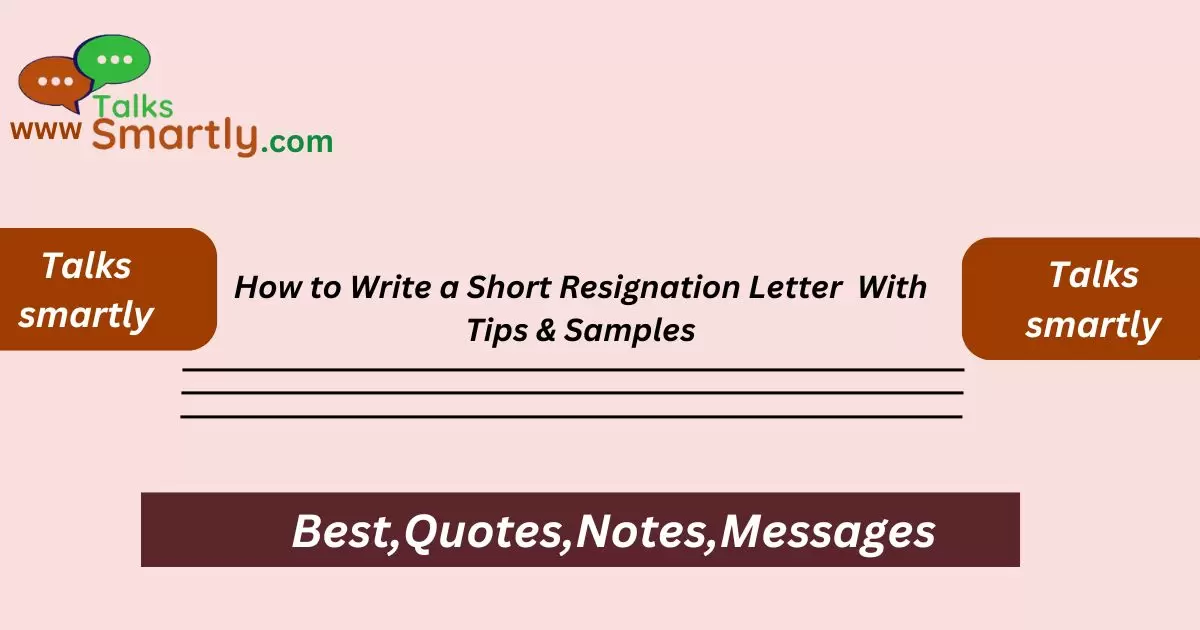Introduction
Writing a short resignation letter involves clearly stating your intention to resign, specifying your last working day, and expressing gratitude, all while maintaining a professional tone.
In today’s professional world, resigning from a job gracefully is an essential skill. A resignation letter is not just a formality but a reflection of your professionalism. Whether you’re moving on to a new opportunity or simply ready for a change, knowing how to craft a short resignation letter effectively can leave a positive impression.
This guide will walk you through the purpose, elements, and step-by-step process of writing a concise resignation letter, along with sample letters for your reference.
How to Write a Short Resignation Letter (With Tips & Samples)
Dear [Recipient’s Name],
In today’s professional world, resigning from a job gracefully is an essential skill. A resignation letter is not just a formality but a reflection of your professionalism. Whether you’re moving on to a new opportunity or simply ready for a change, knowing how to craft a short resignation letter effectively can leave a positive impression. This guide will walk you through the purpose, elements, and step-by-step process of writing a concise resignation letter, along with sample letters for your reference.
Understanding the Purpose of a Resignation Letter
A resignation letter serves several crucial purposes in your professional life. It formally communicates your decision to leave a position and initiates the process of transition. Here’s why it’s important and what it should accomplish:
- Notify Your Employer: Clearly state your intention to resign from your current position.
- Provide Formal Notice: Serve as official notice to your employer, typically in advance as per your employment contract.
- Maintain Professionalism: Convey your appreciation for the opportunities provided and leave a positive final impression.
- Document the Decision: Create a written record of your resignation for HR and company records.
Key Elements of a Short Resignation Letter
A short resignation letter should be concise yet comprehensive. Include the following key elements to ensure clarity and professionalism:
- Header with Contact Information: Your name, job title, company name, and contact information.
- Date of Submission: The date when you submit the letter.
- Recipient Information: Name and position of the person receiving the letter.
- Statement of Resignation: Clear statement of your intention to resign.
- Last Working Day: Specific date of your last working day.
- Gratitude: Express gratitude for the opportunities and experiences gained.
- Offer Assistance: Offer to assist during the transition period.
- Contact Information: Provide your contact details for any follow-up.
- Closure: Conclude on a positive note, reiterating your appreciation.
- Signature: Sign the letter formally.
Funny Comebacks When Someone Calls You A Liar!
Step -by-Step Guide to Writing Your Resignation Letter

Writing a short resignation letter can be straightforward with these step-by-step instructions:
- Prepare Mentally: Reflect on your decision and ensure it’s final.
- Choose the Format: Decide on the letter format (email or printed).
- Header Details: Include your and the recipient’s details.
- Date and Salutation: Start with the date and a formal salutation.
- State Your Intent: Clearly state your decision to resign.
- Specify Last Day: Mention the exact date of your last working day.
- Express Gratitude: Thank your employer for the opportunities.
- Offer Help: Offer assistance during the transition period.
- Provide Contact Information: Include your contact details.
- Close Professionally: End on a positive and professional note.
Sample Resignation Letters
Here are some sample resignation letters to guide your writing process:
Sample 1: Simple Resignation Letter
[Your Name]
[Your Job Title]
[Company Name]
[Date]
[Recipient’s Name]
[Recipient’s Job Title]
[Company Name]
Dear [Recipient’s Name],
I am writing to formally resign from my position as [Your Job Title] at [Company Name], effective [Last Working Day, typically two weeks from the date of submission].
I have appreciated the opportunities for professional growth and development provided by [Company Name]. Thank you for your guidance and support during my tenure.
Please let me know how I can assist in transitioning my responsibilities. You can reach me at [Your Phone Number] or [Your Email Address] for any further information needed.
I wish [Company Name] continued success in the future.
Sincerely,
[Your Name]
Sample 2: Grateful Resignation Letter
[Your Name]
[Your Job Title]
[Company Name]
[Date]
[Recipient’s Name]
[Recipient’s Job Title]
[Company Name]
Dear [Recipient’s Name],
I am writing to resign from my position as [Your Job Title] at [Company Name], effective [Last Working Day].
I am deeply grateful for the opportunities for growth and development that [Company Name] has provided me. It has been a pleasure working with such a dedicated team.
Thank you again for the support and guidance throughout my tenure here. I look forward to staying in touch and wish [Company Name] continued success.
Best regards,
[Your Name]
Sample 3: Grateful Resignation Letter
[Your Name]
[Your Job Title]
[Company Name]
[Date]
[Recipient’s Name]
[Recipient’s Job Title]
[Company Name]
Dear [Recipient’s Name],
I am writing to inform you of my decision to resign from my position as [Your Job Title] at [Company Name], effective [Last Working Day].
I want to express my heartfelt gratitude for the opportunities and experiences I’ve gained at [Company Name]. I have learned a great deal and am thankful for the support of my colleagues and management.
Please let me know how I can assist during this transition. You can reach me at [Your Phone Number] or [Your Email Address].
Thank you once again for everything.
Warm regards,
[Your Name]
Sample 4: Grateful Resignation Letter
[Your Name]
[Your Address]
[City, State, ZIP Code]
[Email Address]
[Phone Number]
[Date]
[Recipient’s Name]
[Recipient’s Title]
[Company Name]
[Company Address]
[City, State, ZIP Code]
Dear [Recipient’s Name],
I hope this letter finds you well. It is with mixed emotions that I am writing to formally resign from my position at [Company Name], effective [Last Working Day, typically two weeks from the date of the letter].
Over the past [duration of employment], I have had the privilege of working alongside a remarkable team and contributing to projects that I am truly proud of. The opportunities for growth and learning provided by [Company Name] have been invaluable, and I am incredibly grateful for the support and guidance I have received from you and my colleagues.
This decision was not easy to make, as [Company Name] has become more than just a workplace to me. It has been a place of professional and personal development, and I have formed lasting relationships that I will always cherish. However, after careful consideration, I believe it is time for me to explore new challenges and opportunities that align with my long-term career goals.
I am committed to ensuring a smooth transition during my remaining time here. Please let me know how I can best assist in training my replacement or handing over my responsibilities. I want to make sure that the projects and tasks I have been working on continue seamlessly after my departure.
Thank you once again for the incredible experience and the opportunities for growth you have provided me. I am confident that the skills and knowledge I have gained here will serve me well in my future endeavors. I look forward to staying in touch and wish the company continued success.
Warmest regards,
[Your Name]
Conclusion
Writing a short resignation letter is a significant step in your career journey. By following these guidelines and utilizing the sample letters provided, you can ensure that your resignation is handled with professionalism and grace.
Remember, clarity, gratitude, and professionalism are key elements to include in your letter. Whether you’re leaving for new opportunities or personal reasons, a well-written resignation letter can leave a lasting positive impression.












